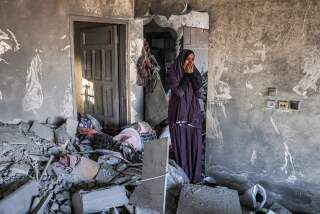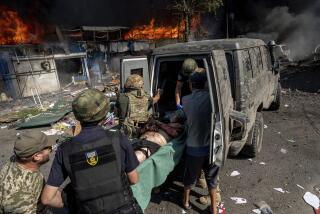Why No Fury at Soviet Atrocities in Afghanistan?
- Share via
The uproar over President Reagan’s visit to the Bitburg cemetery in West Germany makes one thing clear: The world has neither forgotten nor forgiven the terrible atrocities committed by the Nazis in World War II, when millions of men, women and children were slaughtered in concentration camps and whole villages were exterminated by firing squads.
The long memories are appropriate. But it would be nice if the continuing horror over what happened four decades ago would prevent the same sort of thing from happening again in other places. Unfortunately, that isn’t the case.
One terrible case in point (though by no means the only one) is the situation in Afghanistan, which was invaded and occupied by the Soviet Union in late 1979. Five years later, a guerrilla war against the Soviet occupation forces is still going on.
Counterinsurgency operations are cruel by nature. Pilots of bombers and helicopter gunships can’t always tell the difference between a harmless village and a nest of guerrillas--and the villagers don’t get the benefit of the doubt. Isolated cases of savagery are committed by frightened soldiers avenging comrades whose throats were cut by guerrilla infiltrators.
Nobody claims that the mujahedeen in Afghanistan are angels, and the anti-Soviet guerrillas must expect rough treatment when they fall into Soviet hands.
However, there is never an excuse for the calculated, deliberate massacre of civilian non-combatants as a matter of policy. That’s why the Nazis were universally condemned for obliterating the Czechoslovak town of Lidice and executing every male inhabitant. Yet the world seems hardly to notice (or care) that Soviets and their supporters are committing the same kind of deliberate atrocities in Afghanistan.
To quote a December report by the U.S. Helsinki Watch Committee: “Just about every conceivable human-rights violation is occurring in Afghanistan, and on an enormous scale. The crimes of indiscriminate warfare are combined with the worst excesses of state-sanctioned violence against civilians.”
The committee said that, while the Soviet-run Afghan forces are heavily involved in the atrocities, “Soviet personnel have been taking an increasingly active role.”
A study commissioned by the United Nations Human Rights Commission came to similar conclusions. Among the specifics was an operation in which three Afghan villages were destroyed and 505 civilians executed. Torture, it said, has become an “administrative practice.” (It should be noted that Felix Ermacora, author of the U.N. report, is an Austrian who previously investigated human-rights abuses by the racist South African government and the military regime in Chile.)
Neither the U.N. study nor the Helsinki Watch report attracted much attention in the world press. Unlike Vietnam, Afghanistan is not a television war because the Russians and the Soviet-imposed government of Afghanistan take great care to keep cameras away from the action.
The door is virtually closed to major elements of the non-Communist media, as well as to humanitarian organizations. Firsthand reports of the war come mostly from a few intrepid scholars and journalists who go in from Pakistan with resistance groups, and from doctors managing to maintain a precarious permanent presence.
Both Helsinki Watch and the U.N. group were forced to rely mostly on extensive interviews with Afghan refugees, more than 4 million of whom have fled the country. But those interviewed included doctors, lawyers, professors and former government officials, as well as farmers and shepherds. The investigators are convinced that their informants are credible.
Helsinki Watch heard numerous accounts of incidents in which the Soviets bombed a village, then sent soldiers who killed women and children, burned crops and slaughtered livestock.
Lest the refugee accounts be too easily dismissed, supporting testimony comes from a group of Westerners with direct knowledge of the atrocities: The Paris-based Medecins sans Frontiers, which operates six hospitals inside Afghanistan. Its executive director, Dr. Claude Malhuret, charges that the Soviets have deliberately bombed and destroyed hospitals run by the European group, and routinely drop anti-personnel mines designed to maim rather than kill--because “an injured person is much more trouble (to the guerrillas) than a dead person.”
The French doctor confirms that Soviet helicopters drop booby-trapped toys, in most cases plastic pens or small red trucks. In his words, “Their main targets are children whose hands and arms are blown off.”
Malhuret and Helsinki Watch both conclude that the Soviets are following a counterguerrilla strategy aimed not at securing territory as such, but at using terror to empty the countryside of all but the guerrilla fighters, who in theory can then be isolated and destroyed. The killing of innocent people isn’t a byproduct of the strategy, but its very heart.
Virtually nobody in the outside world would seriously suggest that the United States and other Western powers should intervene militarily to throw the Soviets out of Afghanistan. But why isn’t there at least a deafening worldwide demand for an end to the Soviet atrocities? Why are those who are so sensitive to the massive injustice of South African apartheid so silent in the face of the Soviet behavior in Afghanistan?
There are a number of explanations: Out of sight, out of mind. A reluctance to believe that the atrocities are really occurring because, once the reality was accepted, there would be an implicit responsibility among civilized people to do something about it. Concern that too much political pressure on the Soviets would interfere with the larger goal of nuclear-arms reduction.
“Never again” obviously doesn’t apply to Afghanistan. It turns out to be more convenient to hurl thunderbolts at the perpetrators of atrocities that occurred more than 40 years ago than to be beastly to those who are committing such crimes in the here and now.
More to Read
Sign up for Essential California
The most important California stories and recommendations in your inbox every morning.
You may occasionally receive promotional content from the Los Angeles Times.













